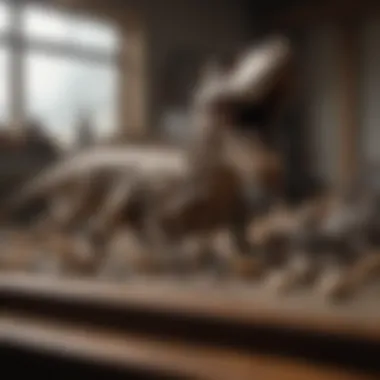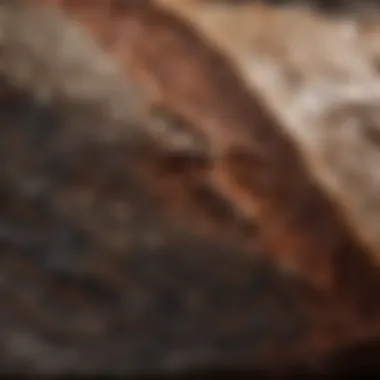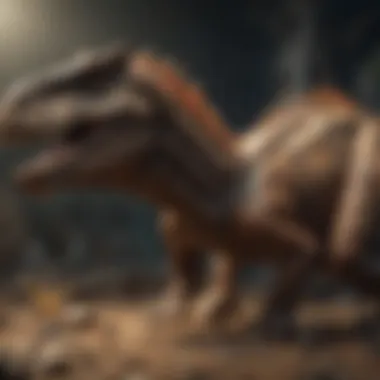Exploring Dinosaur Fossils on eBay: A Collector's Guide


Intro
Dinosaur fossils have captivated the imagination of many collectors. With their unique history and the mystery they embody, these remnants of a bygone era offer an enduring appeal. As the market for such collectibles expands, online platforms like eBay have emerged as pivotal spaces for purchasing and selling dinosaur fossils. This evolution of the marketplace presents an opportunity and a challenge for both novice and seasoned collectors.
The following sections will guide you through the process of exploring dinosaur fossils on eBay. We will touch upon the history of collectibles in this context, identify and classify the types available, and address concerns over authenticity and legalities. Armed with this knowledge, collectors can engage in informed transactions that respect both the scientific significance and cultural heritage associated with fossils.
Preface to Dinosaur Fossils on eBay
The world of dinosaur fossils on eBay presents a unique and fascinating marketplace for collectors. This article aims to illuminate the nuances of engaging with this digital platform for acquiring these ancient treasures. Understanding how to navigate this space is vital for any collector, whether they are experienced or just beginning their journey. The importance lies not only in acquiring fossils but also in ensuring authenticity, legality, and ethical collection practices.
The Rise of Online Fossil Trading
The internet has fundamentally changed how collectors access dinosaur fossils. Once, enthusiasts relied on traditional avenues like fossil shows or local dealers. Now, online platforms have expanded the reach and availability of specimens dramatically. eBay, as a giant in the online marketplace, has particularly accelerated this shift. The variety of fossils available on eBay is remarkable. You can find everything from small fragments to large, visually striking pieces.
However, this rise in online trading also invites several challenges. Certain risks come with buying fossils online. The potential for fraud, the difficulty of verifying authenticity, and understanding the legal contexts of fossil trading are all aspects collectors must consider.
Why eBay? Analyzing the Marketplace
Choosing eBay for fossil acquisition has its advantages. eBay offers a wide selection. The platform is not limited by geographical constraints. Therefore, collectors can find fossils that may be unavailable in their local markets. Prices vary widely, which can be beneficial for those operating on a budget.
Yet, eBay is not without its drawbacks. The lack of direct seller interaction can make it hard to assess the credibility of a listing. Additionally, the sheer volume of listings can overwhelm novice buyers. Familiarity with eBay's bidding system and understanding how to spot potential scams become necessary skills.
Understanding Dinosaur Fossils
Understanding dinosaur fossils is crucial for any collector engaging with this unique segment of paleontological artifacts. Fossils provide a tangible connection to the distant past. They can tell us about the biology, behavior, and environment of dinosaurs. As a collector, knowledge of the various types of fossils is vital. It's not only about acquiring them but also about appreciating their historical significance and integrity. A sound understanding facilitates informed purchasing decisions and enhances the collector's experience.
Types of Dinosaur Fossils Available
When delving into the world of dinosaur fossils, there are several types that collectors may encounter. These categories each have distinct characteristics and offer unique insights into the life of dinosaurs.
Bone Fragments
Bone fragments are perhaps the most recognized type of dinosaur fossils. They consist of small, broken pieces of dinosaur bones. Collectors often find these appealing because they represent direct physical evidence of dinosaur existence. They provide valuable information about the size, diet, and type of dinosaur. The unique feature of bone fragments is that they can be quite accessible. Many sellers list them at reasonable prices, making them a beneficial choice for novice collectors.
However, the downside is that the scientific value can be low if they are incomplete or poorly identified. Buyers should be cautious in authenticating these pieces to avoid forgeries or misclassifications.
Trackways
Trackways refer to the preserved footprints of dinosaurs, and they can reveal much about a dinosaur's behavior and movement. Collectors find trackways fascinating as they offer a snapshot of a dinosaur's life. Enthusiasts appreciate them for their detailed impressions which can sometimes include the path of a group of dinosaurs traveling together.
The advantage of trackways is that they are not only rare but also visually striking when displayed. However, their fragility can be a disadvantage as they may be more susceptible to damage. Additionally, the provenance matters greatly in trackways, influencing their value.
Coprolites
Coprolites are fossilized dinosaur feces. While they may seem unappealing, coprolites offer unique insights into the dietary habits of dinosaurs. Collectors appreciate them because they can contain undigested food remnants, providing context about the dinosaur's prey and environment.
A key characteristic of coprolites is their diversity; they vary significantly based on the species that produced them. They are a beneficial choice for those looking to expand their collection beyond conventional fossils. On the downside, authenticity can be difficult to assess, leading to potential concerns about misrepresentation.
Shells
Shells, often from marine reptiles or other prehistoric creatures, also fall under dinosaur fossils. These fossils can provide insights into the ancient ecosystems in which dinosaurs lived. Collectors often value shells for their beauty and uniqueness.


The advantage of shells is that they often are well-preserved, making them suitable for display. However, their connection to dinosaurs might be less direct than with bone fragments, limiting their appeal to certain collectors. Knowledge of the shell's provenance is key in this context.
How Fossils are Formed
The formation of fossils is a complex process that requires specific conditions. Generally, fossils form when an organism is buried quickly after death. This can protect it from decay and scavenging. Over time, sediments accumulate over the remains, and the organic material gradually mineralizes, turning it into a fossil. The study of fossil formation, known as taphonomy, can inform collectors about the age and context of fossils. Understanding these processes can enhance a collector's appreciation for the artifacts they acquire and encourage responsible collecting practices to preserve these invaluable remnants of the past.
The eBay Buying Experience
The experience of buying dinosaur fossils on eBay can greatly influence a collector's journey. This platform offers a unique environment where buyers can explore extensive listings from various sellers, often featuring rare finds. The global reach of eBay enables collectors to access fossils that might not be available locally, thus expanding their options considerably. However, with such opportunities come challenges that require careful consideration.
Navigating Online Listings
When browsing through the listings on eBay, it's essential to approach with a clear strategy. The sheer volume of available fossils can be overwhelming, but effective navigation can lead to invaluable discoveries. Consider the following tips:
- Use specific keywords: Searching with terms like "dinosaur bone" or "dinosaur footprint" yields more accurate results.
- Filter by categories: eBay allows filtering by types, price ranges, and geographical locations. This can help narrow your search efficiently.
- Check auction or Buy It Now options: Understanding the type of listing can help decide how much time to invest. Auctions can result in good deals if you monitor closely.
Investing time to familiarize yourself with eBay’s search functions is a worthwhile effort. This can save both time and money, providing a more streamlined shopping experience.
Evaluating Seller Credibility
One of the most crucial aspects of buying fossils online is evaluating seller credibility. Many sellers may present themselves as reliable, but thorough due diligence is necessary. Here are several factors to consider:
- Seller ratings and reviews: Checking ratings can provide insights into the seller's history. Sellers with a high percentage of positive feedback are usually more trustworthy.
- Completion of sales: Look for sellers who have successfully completed multiple transactions. A history of sales indicates an experience level that can reduce the risks involved.
- Communication: A prompt response to inquiries can signal reliability. Reputable sellers will often be willing to provide additional information or answer questions.
Determining the credibility of a seller is significant. If you encounter a new seller or an unusually low price, this can signal a need for caution.
Assessing Item Authenticity
The authenticity of dinosaur fossils is a central concern for collectors. With the rise in online sales, the potential for counterfeit items has increased. Here are strategies to assess authenticity:
- Request detailed photographs: Clear images from multiple angles can reveal critical details not describable in text. Look for texture, color variations, and any other unique features.
- Research the item: Understanding specific characteristics of the fossil type can help identify if it meets expected criteria. For example, knowing how genuine bone appears versus replicas helps in assessing authenticity.
- Seek expert opinions: If uncertain, consulting experts or utilizing online resources will provide reassurance. Community forums, like those on Reddit, can often connect you with knowledgeable individuals.
"Proper verification of fossils not only safeguards your investment but also enriches your collecting experience."
In summary, navigating eBay as a platform for purchasing dinosaur fossils involves four key elements: navigating listings, evaluating seller credibility, and assessing item authenticity. By considering these aspects, collectors can make informed decisions leading to successful acquisitions.
Legal and Ethical Considerations
Legal and ethical considerations are crucial aspects of purchasing dinosaur fossils on platforms like eBay. As this market grows, the importance of understanding regulations becomes clear. Collectors must navigate a complex landscape that includes laws governing fossil trade and ethical practices surrounding fossil collection. These elements can affect not just individual buyers but also the larger community of fossil enthusiasts.
Understanding regulations helps collectors make informed choices. Laws about fossil trading vary by country and can involve international treaties. In the United States, for example, the Fossil Preservation Act aims to protect fossils on federal lands. Buyers need to ensure that the fossils they purchase were acquired lawfully. This protection is vital for maintaining the integrity of fossil finds and promoting responsible collecting practices.
Ethical considerations extend this legal framework. Fossil collection practices can have a significant impact on archaeological sites and the scientific community. Collectors should reflect on the origins of the fossils and the implications of their purchase. Ethical sourcing respects not only the fossil itself but also the context in which it was found. This respect helps preserve valuable scientific information that could otherwise be lost.
"A fossil without its context is like a book without its pages."
Collectors must be conscious of the balance between personal interest and broader ethical responsibilities. Being aware of these nuances not only enriches one's collecting experience but also fosters a community dedicated to the preservation and appreciation of these ancient relics.
Regulations on Fossil Trade
The regulations surrounding fossil trade are complex and often vary across different jurisdictions. In the United States, federal and state laws can influence how and where fossils can be collected and sold. For instance, fossils found on public lands are subject to specific legal frameworks, often forbidding private ownership. Collectors should research local rules to avoid legal complications.
Key regulations to consider include:


- The Fossil Preservation Act protects fossils on federal land.
- Many states have their own laws regulating fossil collection.
- International treaties can control the export of fossils between countries.
It is important to verify the geographic location of fossils being sold. Some sellers may not disclose the origin, which can hinder a buyer's assessment of legality. Always ask the seller for provenance documentation if available.
Ethics of Fossil Collection
The ethics of fossil collection involve considerations beyond simple legality. Collectors ought to reflect on the environmental and scientific impact of their collecting practices. Over-collecting can damage sites of paleontological significance. Therefore, it is advisable for collectors to adhere to guidelines that promote responsible behavior.
Some ethical considerations include:
- Respecting archaeological sites: Always avoid disturbing locations that have historical significance.
- Supporting scientific research: Whenever possible, share finds with museums or educational institutions.
- Documenting the collection process: Keep clear records of where and how fossils were obtained.
Understanding these ethical responsibilities fosters a culture among collectors that values transparency and preservation. Collectors who adopt ethical practices contribute positively to the future of fossil collection and the learning opportunities it presents.
By embracing both legal regulations and ethical principles, collectors ensure they participate in a responsible and respectful manner in the marketplace of dinosaur fossils.
Making an Informed Purchase
Making an informed purchase is crucial when it comes to buying dinosaur fossils on eBay. The market is vast, and many options exist. This section focuses on important elements that a buyer should consider before committing to a purchase. Understanding the process can significantly affect both the satisfaction with the purchase and the value of the fossil.
The sheer variety of fossils available means that without research and due diligence, collectors may end up with items that do not meet their expectations. An informed decision can save time and money, ensuring that collectors obtain authentic and valuable specimens. Each subsections below highlights specific aspects of this process that collectors must tread carefully through.
Researching Prior to Purchase
Before making any purchase, thorough research is essential. Familiarizing oneself with the types of fossils available can enhance the buying experience. Collectors should begin by looking into reputable sources that offer accurate information. Websites like Wikipedia and Britannica provide valuable insights into fossil types and formation processes.
Buyers should also delve into the characteristics of the specific fossils they wish to acquire. This includes understanding the species, age, and geographic origin of the fossils in question. Having this knowledge can help in identifying reputable sellers and distinguishes genuine fossils from replicas.
Moreover, engaging with collector communities on platforms such as Reddit or Facebook can yield practical advice and experiences from fellow enthusiasts. These peer interactions can enhance understanding and help avoid pitfalls commonly faced in online fossil trading.
Price Comparisons and Valuation
Understanding the market value of fossils is another key aspect of making an informed purchase. Collectors should be aware of the pricing spectrum for various fossil types. Comparing prices across multiple listings is essential for gauging reasonable pricing. This can help prevent paying overheated prices or being deceived by unrealistic offers.
To ascertain fair value, collectors should closely consider factors such as:
- Type of fossil
- Condition and preservation quality
- Provenance history
- Demand for the specific type
Additionally, looking for auction histories and previous sales helps collectors see price fluctuations over time. Understanding these aspects can greatly aid in negotiation when bidding or making offers. The goal is to feel confident that the price paid reflects the true value of the fossil.
Return Policies and Buyer Protections
Being aware of return policies and buyer protections is highly important when purchasing fossils online. The nature of online transactions can sometimes lead to misunderstandings or discrepancies in product description versus reality. Before finalizing a purchase, collectors should thoroughly read the return policies offered by the seller.
Important points to consider include:
- Timeframe for returns
- Condition requirements for returning items
- Seller willingness to accommodate return requests
Buyers should also look for eBay’s checkout protections, which can provide an added layer of security in case an item arrives not as described. Understanding these protections can instill confidence while making significant purchases.
Always prioritize research. An informed buyer is less likely to encounter regrettable purchases.
Caring for Your Fossil Collection


Caring for a fossil collection is an integral part of being a collector. Proper care ensures that these irreplaceable specimens retain their scientific and aesthetic value. Fossils can deteriorate over time due to environmental factors, mishandling, and improper storage. Therefore, understanding how to care for your fossils is essential for any enthusiast.
When cared for effectively, fossils can provide invaluable insights into the Earth's history and enrich your collection for years to come. Many collectors may overlook the importance of proper care, underestimating how much damage can be caused by neglect.
Displaying Fossils Safely
When displaying fossils, it is crucial to choose the right environment. Natural light can fade colors and cause damage. Instead, display fossils in low light conditions. Avoiding humidity is also vital, as moisture can lead to mold and degradation.
Here are some key considerations for safe display:
- Use UV-filtering glass to protect from sunlight.
- Choose a stable temperature area, ideally between 65°F and 70°F.
- Avoid placing fossils near heating or cooling vents.
- Keep them out of reach of children and pets to prevent accidental damage.
Secure your fossils in display cases or shelves that offer protection while still allowing you to showcase your collection.
Maintenance and Preservation Techniques
Regular maintenance of your fossil collection is essential for long-term preservation. Cleaning should be approached with care, as incorrect methods may cause irreversible damage.
Here are some maintenance tips:
- Use a soft brush or cloth to remove dust. Avoid water unless absolutely necessary, as it can damage fragile fossils depending on their composition.
- Consider using a conservation-grade adhesive for minor repairs. This will help stabilize any fractures. Avoid amateur repairs that may harm the fossil further.
- Store fossils in acid-free containers to prevent chemical reactions that can degrade materials.
Lastly, record the provenance of each fossil. Keeping documentation about the collection sources adds to the significance and helps maintain value.
"Caring for fossils is not just about preserving them; it's about honoring their historical and scientific importance."
By adhering to these guidelines, collectors can protect their investments while also ensuring that their fossil collections can be enjoyed for generations to come.
Community and Resources
In the realm of collecting dinosaur fossils, the importance of community and resources cannot be overstated. Collectors, whether novices or seasoned veterans, often find that the journey towards acquiring and maintaining a successful collection is enriched through connections with others who share their passion. Engaging with a community allows collectors to learn from one another, share experiences, and access valuable resources that can guide their collecting endeavors.
Connecting with Other Collectors
Establishing connections with fellow collectors is vital for several reasons. These relationships can foster a sense of belonging and support within the often niche and specialized world of fossil collecting.
- Networking Opportunities: Forming ties with other collectors opens avenues for networking, where one can share tips, leads on quality fossils, or even trade pieces to enhance their collection.
- Knowledge Sharing: Experienced collectors can provide insights regarding assessment of authenticity, pricing trends, and best practices for caring for fossils. Newer collectors benefit greatly from these insights, which can reduce potential mistakes.
- Social Engagement: Online forums, such as those found on reddit.com or dedicated Facebook groups, offer platforms where collectors can engage in discussions. These communities become spaces for asking questions, displaying recent finds, and sharing knowledge about fossil geology.
"Community is at the heart of successful collecting. The insights gained from others can elevate one's understanding and appreciation of fossils."
Educational Resources for Fossil Enthusiasts
Beyond personal connections, educational resources play a significant role in a collector's journey. The right information can transform what may seem like an overwhelming pursuit into an informed and enjoyable hobby.
- Books and Publications: Many books delve into the science of paleontology, fossil identification, and ethical considerations in collecting. Titles from credible authors can become valuable resources for anyone looking to deepen their understanding.
- Online Courses and Lectures: Institutions and passionate paleontologists offer courses that cover various aspects of fossil study. Websites such as britannica.com provide articles and guides for self-paced learning.
- Local Museum Programs: Museums often host workshops and lectures about fossils. Participating in these events enhances learning through direct interaction with experts.
- Social Media and Discussion Forums: Engaging with platforms that focus on fossil collecting can expose collectors to new information and emerging trends within the community.
By leveraging available resources and actively connecting with others in the field, collectors can not only enhance their knowledge but also navigate the complex landscape of fossil trading more confidently.
Finale
Another key consideration involves legal and ethical factors. Collectors should be aware of the regulations that govern fossil trading and the moral responsibilities they hold. Being informed in these areas not only protects the individual collector but also ensures the sanctity and future of fossil resources.
The future of fossil trading online appears promising, especially as communities of collectors grow. As more individuals connect and exchange knowledge, the market will likely evolve, providing even greater access to diverse fossils. This eventual progression could foster a richer understanding of paleontology among enthusiasts.
Engagement in this community can also encourage responsible collecting practices, vital for preserving the archaeological record of our planet. Therefore, as we reflect on the insights provided, it becomes clear that informed and ethical practices are paramount in this fascinating pursuit.
"Informed collectors play a crucial role in protecting not only their interests but also the integrity of fossil resources for future generations."
Ultimately, embracing the knowledge shared in this guide can enrich the collecting experience, helping both novice and seasoned collectors make astute choices. By prioritizing authenticity, legality, and community interaction, the path to successful fossil collecting on eBay can be navigated with confidence.



